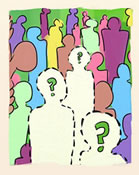Online daters have become disillusioned with standard profile-based sites that are now the internet dating norm. Trolling through endless profiles and reading near-identical bios often seems more like work than pleasure.
Research published in the Journal Of Interactive Marketing suggests this is because online dating interfaces tend to treat people like commodities – daters search profiles for matches using check-box categories, just as if they were shopping for a TV. Consequently the big online dating sites have seen a reduction in their growth.
A new experiment, though, suggests that online dating could be improved with virtual dates in which people can experience each other in something closer to a real encounter. Welcome to Internet Dating 2.0.
The problem with online dating
The research, conducted by Jeana H. Frost and colleagues, first wanted to establish exactly how people use currently well-established online dating systems (Frost, Chance, Norton & Ariely, 2008).
Finding a connection with another person is all about the interaction: it is an experiential process. In a survey of 132 internet daters, the researchers found that users of a profile-based online dating site spent seven times as long screening other people’s profiles and sending emails than they did actually interacting face-to-face on real dates. As a result participants reported finding online dating unsatisfying and aversive.
Frost and colleagues argue that part of the problem with online dating is the search mentality. In reality what makes people click together is hard to boil down to a few attributes in a search box. Finding a connection with another person is all about the interaction: it is an experiential process.
Online daters end up wasting so much time because the interface encourages endless ticking of boxes, searching profiles and sending emails, rather than actually experiencing another person.
Virtual dating
Instead of search-based online dating Frost and colleagues tested a new approach: the virtual date. This encouraged participants to engage in a more interactive experience than simply viewing profiles:
- Participants could instant message each other.
- Images were displayed for the participants to talk about.
- Simple avatars were displayed onscreen which participants controlled.
To evaluate the virtual date in comparison with the more usual profile-based online dating, Frost and colleagues had 24 participants (half male, half female) each randomly assigned to two other opposite-sex participants.
People preferred others who they had first met in the virtual environment to those whose profile they had read.Each went on a virtual date with one of them and just viewed the profile of the other. A day or two later all 24 participants met each other in the flesh at a speed-dating event. After the dating each participant rated those they had met on liking, similarity, excitement and comfort.
The results showed that people preferred others who they had first met in the virtual environment to those whose profile they had read. Further results also suggested that this was romantic-liking rather than just platonic-liking.
The future?
Despite the small sample size in this study, the research does bode well for some of the new generation of dating technologies, dubbed ‘Internet Dating 2.0’, many of which do include virtual environments.
Of course virtual dates are still bleeding edge and it will inevitably take time for both the industry and online daters to adjust. But when they do perhaps then singles will be spared the tedious task of skimming endless profiles in favour of heading off on potentially more successful virtual dates.
[Image credit: royblumenthal]
References
Frost, J. H., Chance, Z., Norton, M. I., & Ariely, D. (2008) People Are Experience Goods: Improving Online Dating With Virtual Dates. Journal Of Interactive Marketing Volume 22(1), 51-61.
» From Time.com: Internet Dating 2.0

